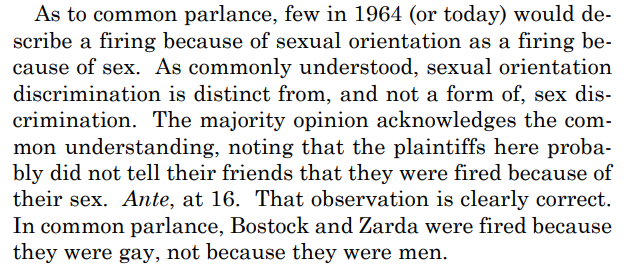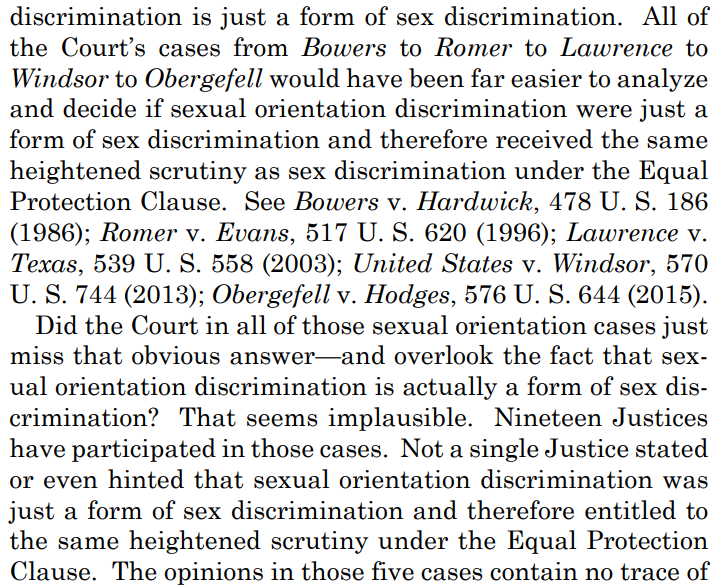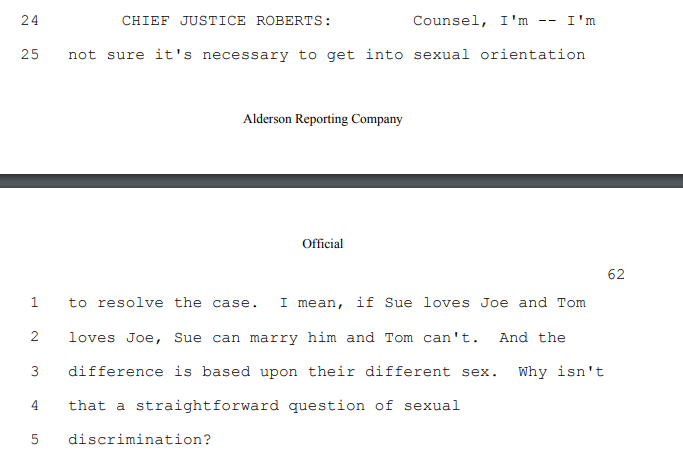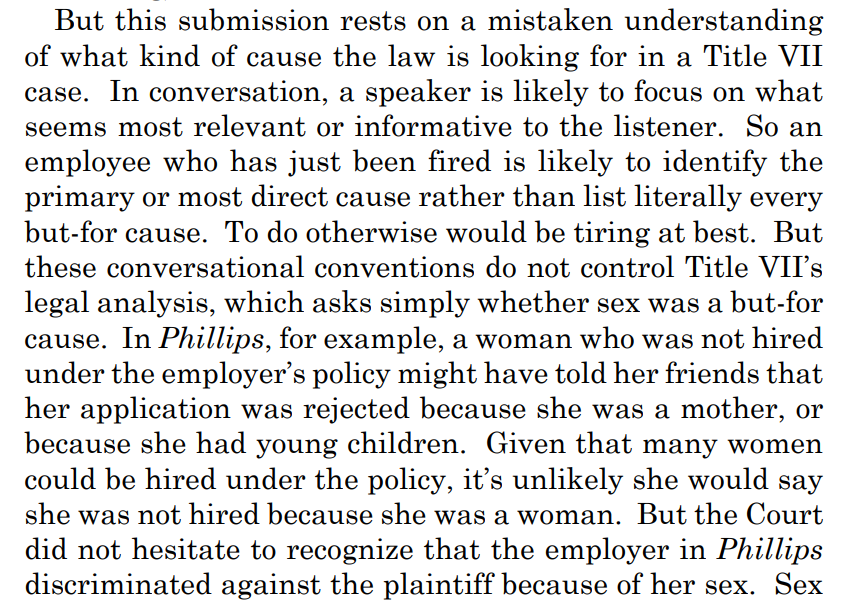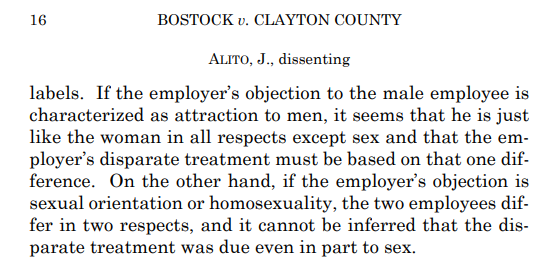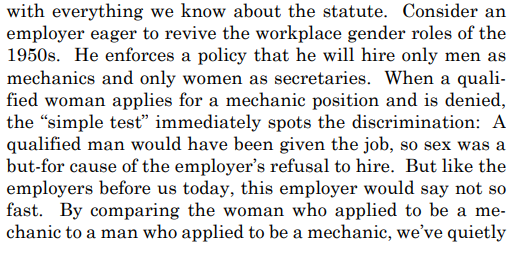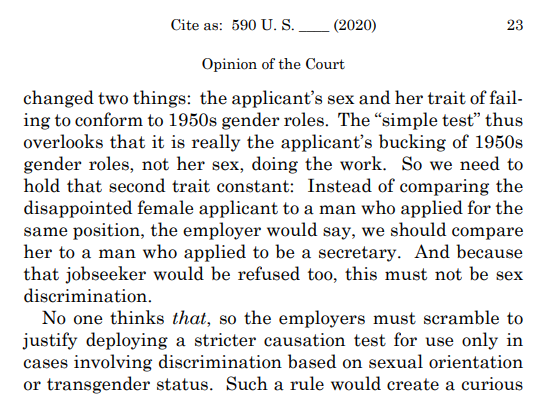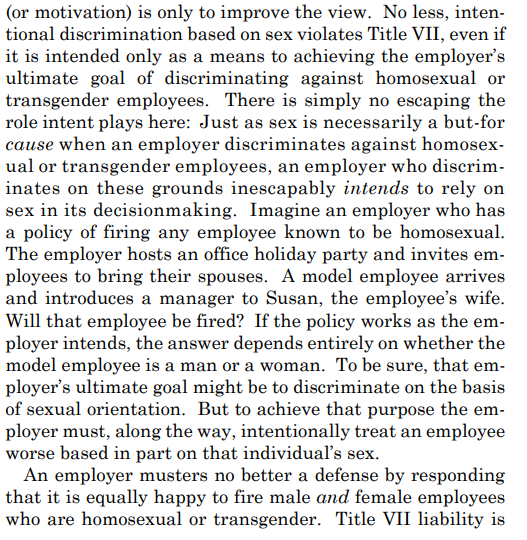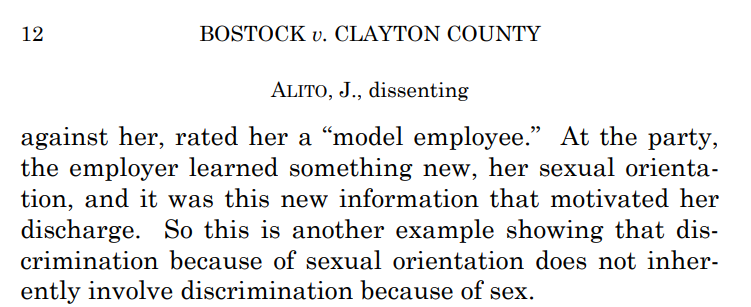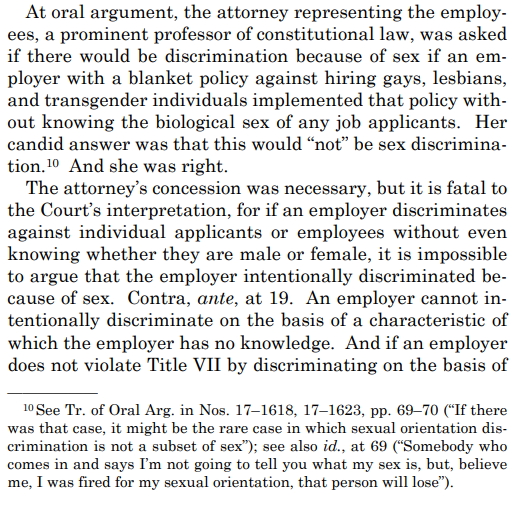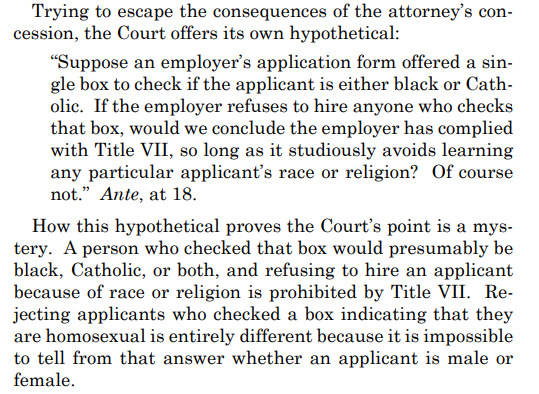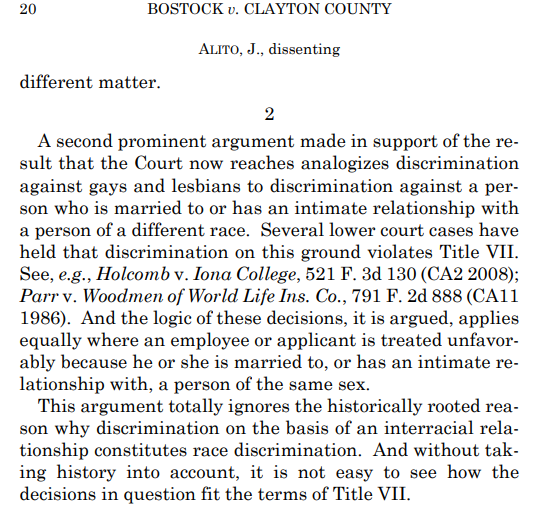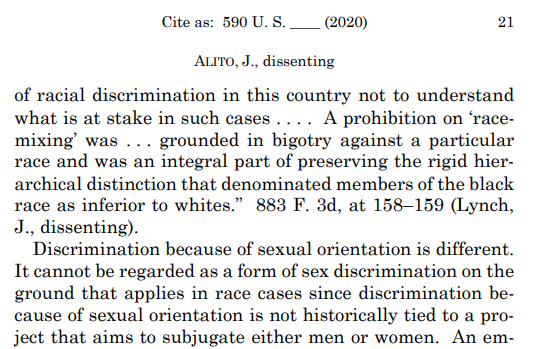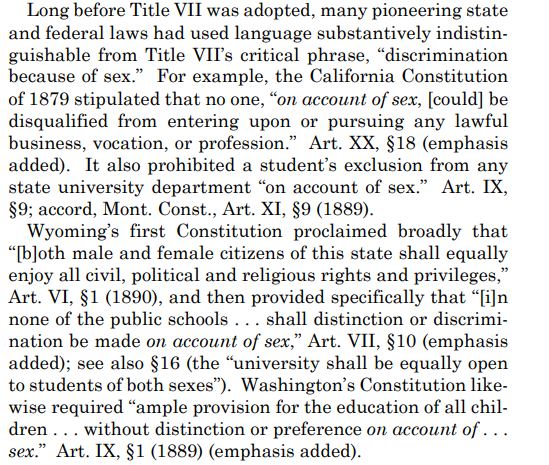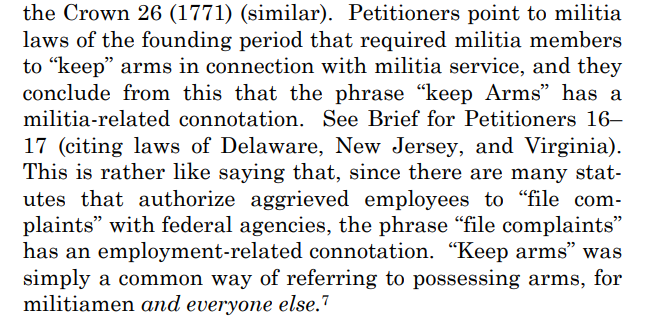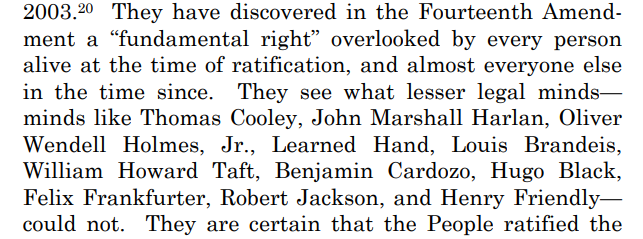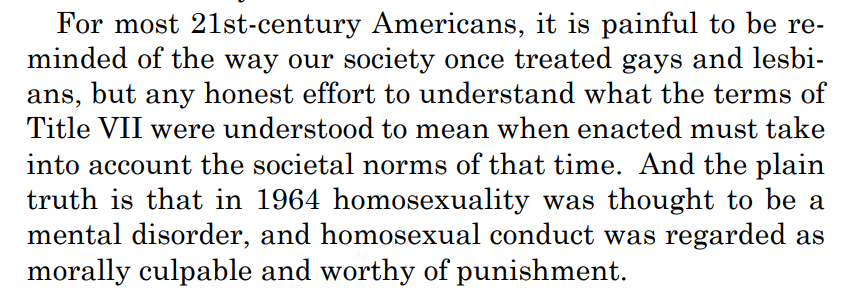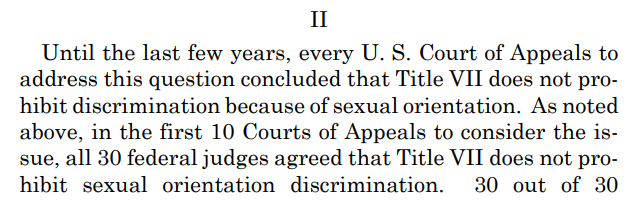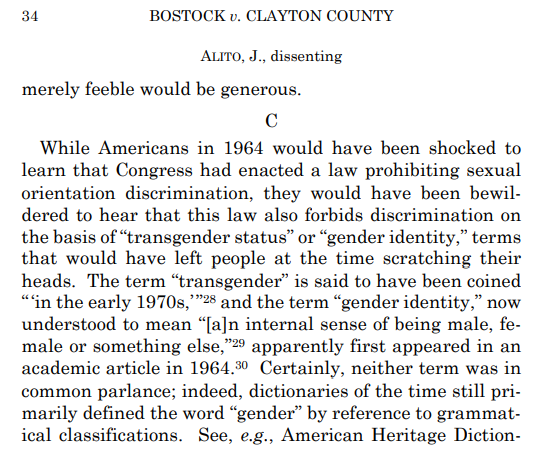Bostock v. Clayton County thread of my thoughts hopefully coming within the next 24 hours, but I& #39;m too tired right now! :) 1/
I& #39;ve finished carefully reading through the opinions in Bostock. I& #39;m inclined to think Gorsuch has it right. It& #39;s an agonizingly difficult issue - I flip-flopped several times while reading the briefs. Was leaning toward employers recently but Gorsuch convinced me otherwise 2/
One of strongest arguments for employers that made this difficult was that people don& #39;t generally think of anti-LGBT discrimination as sex discrimination. If asked by friend why he was fired, Bostock likely wouldn& #39;t say "Because I& #39;m a man." See Kavanaugh& #39;s dissent below. 3/
Similarly, one wouldn& #39;t ordinarily say someone who doesn& #39;t want to hire gay or trans people is "sexist" - they might be called "homophobic" or "transphobic," but it would be unusual to hear them called "sexist." See Alito sentence below. 4/
Moreover, Kavanaugh also notes (picking up point made in at least one amicus brief) that SCOTUS& #39; decisions on gay rights show how even in the constitutional context, a distinction is also made between sex-based discrimination & discrimination based on sexual orientation. 5/
Justice Kavanaugh could have, but did not, add that SCOTUS& #39; failure to suggest sexual orientation discrimination is sex discrimination for constitutional purposes is notable in light of fact that argument was presented in Obergefell -- and even mentioned at oral argument then: 6/
So what does Gorsuch have to say in the face of all that? I actually think his response is pretty persuasive. The analogy to Phillips in particular is terrific: 7/
Additionally, Gorsuch correctly notes that banning discrimination because of sex ≠ banning "sexist" policies. The former can be broader than the latter. 8/
OK, now time to get into the weeds of the proper comparator debate. This is arguably the heart of the case: Who counts as similarly situated to, say, a gay man? As Justice Alito notes, what we have is a "battle of labels" 9/
I remember this being really mind-bending stuff when I was trying to think through it last year. Issue is that if you compare gay man w/ heterosexual woman, you have arguably changed *2* characteristics (sex & sexual orientation), and therefore can& #39;t isolate the role of sex. 10/
Although it& #39;s a super difficult issue, I really like Gorsuch& #39;s hypothetical scenarios, which I think have convinced me that the comparison between treatment of a gay man vs. heterosexual woman is indeed a valid mode of analysis here. Take this scenario: 11/
That provides a clear analogy to Gorsuch& #39;s comparator argument, which was: "If the employer fires the male employee for no reason other than the fact he is attracted to men, the employer discriminates against him for traits or actions it tolerates in his female colleague." 12/
Alito responds to the hypo (below), but I don& #39;t find his take persuasive. He is correct that employer already knows woman& #39;s sex, but all that shows is that her being a woman is not the *sole* reason for firing her -- it& #39;s her being female in combination with her spouse& #39;s sex. 14/
Alito notes it& #39;s theoretically possible to have a blanket policy against LGBT employees w/o actually knowing sex of each employee. Close question whether there can be discrimination b/c of sex there, but here the employers *did* know, so I think Alito& #39;s scenario is irrelevant 15/
But assuming it& #39;s relevant (Alito does raise fair point that there& #39;s "no reason why the same employer could not lawfully implement the same policy even if it knows the sex of these individuals"), I agree w/ Gorsuch that it& #39;s probably still sex discrimination. Cf. Alito here: 16/
I find Alito& #39;s response above bizarre. A person who checked a box indicating they are gay would presumably be either male or female, and refusing to hire an applicant because of sex is prohibited by Title VII. Therefore, the situation is precisely analogous to Gorsuch& #39;s hypo. 17/
I also don& #39;t find persuasive Alito& #39;s attempt to distinguish race from sex under Title VII. Gorsuch doesn& #39;t make this argument, but it& #39;s powerful: It& #39;s racial discrimination to fire white person for marrying black person, so it& #39;s sex discrimination to fire man for marrying man 18/
Alito says anti-miscegenation policies are race discrimination b/c promote white supremacy, not just b/c distinguish based on race. But imagine a strange employer that has such a policy but *isn& #39;t* trying to achieve white supremacy. Does Alito think discrimination now OK?? 19/
Alito& #39;s opinion also tries to argue that sex discrimination can& #39;t encompass LGBT discrimination because, historically, fighting sex discrimination has been part of a movement for equality of women with men. E.g. the examples below. 20/
Alito& #39;s contention there is both true and irrelevant. This is a version of the same mistake Stevens made in his Heller dissent (see below for Scalia& #39;s response). The fact that a phrase is commonly used in a particular context does not show that it& #39;s limited to that context. 21/
More prominently, Justice Alito uses history in a very Scalia-esque way: To show that, supposedly, nobody in 1964 would have thought the statute meant what Gorsuch was interpreting it to mean. 22/ https://twitter.com/BryanAGarner/status/1272603241998622727?s=20">https://twitter.com/BryanAGar...
Alito accuses the majority of "breathtaking" "arrogance," in a major echo of one of the most scorching passages from Scalia& #39;s Obergefell dissent (at left): 23/
For starters, Alito is certainly correct that few people (and quite possibly literally no one) in 1964 would have thought Title VII protected against anti-gay discrimination, given the social context of the time: 24/
Moreover, as Justice Kavanaugh notes, from the statute& #39;s enactment all the way until just a few years ago, every federal appellate court to address the question of whether sexual orientation discrimination was covered by Title VII said no: 25/
Justice Alito appears to believe that because the idea of transgender people wasn& #39;t widely understood in 1964, it is even harder to argue that Title VII proscribes anti-trans discrimination than it is to argue it proscibes anti-gay discrimination (see below). 26/
I think it is quite the opposite: Much easier to imagine how gender identity could& #39;ve been covered by Title VII from start w/o anyone noticing, since concept of gender identity wasn& #39;t well known. 27/
Nobody in 1791 thought 1st Amendment applied to Chuck Todd, but that& #39;s b/c nobody had any idea who Chuck Todd was! 28/
[A little later I will add some more tweets to this thread about how to respond to Alito& #39;s original-expectations argument, as well as the potential consequences of the Bostock decision in terms of religious liberty.]

 Read on Twitter
Read on Twitter